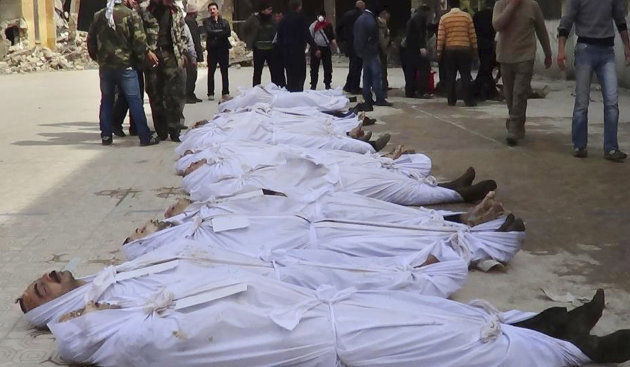A UNICEF report issued Tuesday warned that a whole generation of Syrian children risks being scarred for life because of the unrelenting violence, mass population displacement and damage to infrastructure and services.
The economy has been suffering under the weight of sanctions from the U.S., European Union and the Arab League that include a ban on oil exports.
Besides the economic effects, the civil war has left the nation's industry, infrastructure and many cities, including ancient Aleppo, in ruins.
The rebels control large swathes of territory outside of Aleppo, but the battle for the city itself, Syria's main commercial hub, is locked in a stalemate. Rebels pushed into the city in July and captured several neighborhoods. It has been a major battleground in the civil war ever since.
The army holds large parts of Aleppo and maintains control over the airport, the country's second largest. Crucially, Syria's air space is firmly controlled by the regime in Damascus, which uses its warplanes to bomb rebel strongholds.
The Syrian Observatory for Human Rights said clashes erupted on Tuesday around the airport, and rebels also intensified their assault on the Nairab and Mannagh air bases near the strategic facility, which has not been handling fights for weeks because of the fighting.
Fighting also flared up along the road that links the capital, Damascus, to the country's biggest airport and raged for a second day in the central city of Homs as rebels tried to take back the impoverished neighborhood of Baba Amr, which they lost to Assad's troops a year ago.
Last year, government forces besieged Baba Amr for a month before rebel forces withdrew and the government seized control. Hundreds of people were killed in the siege. On Sunday, rebels pushed back into Baba Amr, and Syrian forces responded by firing heavy machine guns into the neighborhood, sending residents fleeing.
In Geneva, the U.N. food agency said the renewed violence in Baba Amr has forced at least 3,000 families to leave their homes.
In Kiev, Ukraine's Foreign Ministry confirmed that a Ukrainian journalist who was kidnapped in Syria is free after being held by rebels for more than 150 days.
The Russian newspaper Komsomolskaya Pravda quoted Kochneva as saying she walked away from the house where she was held, skirted a rebel guard post and then walked about 15 kilometers (9 miles) through fields until she found a villager who helped her.
The kidnappers released a video in which Kochneva said she was working as a Russian agent, but the newspaper quoted her as saying the recording was made under duress.
Russia is a staunch ally of Damascus, supplying the Assad regime with weapons and shielding his government from tougher U.N. sanctions.
___
Associated Press writers Anna Melnichuk in Kiev, Jim Heintz in Moscow and John Heilprin in Geneva contributed.












